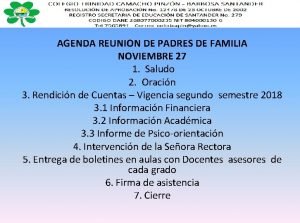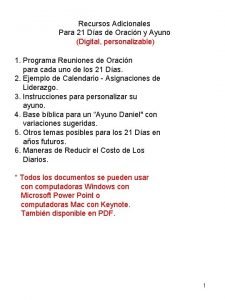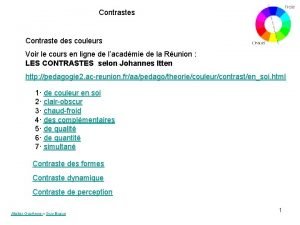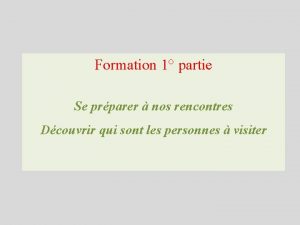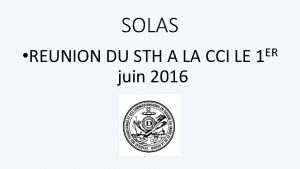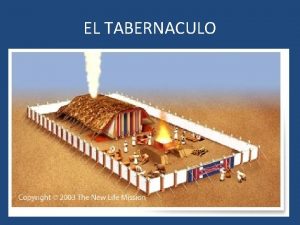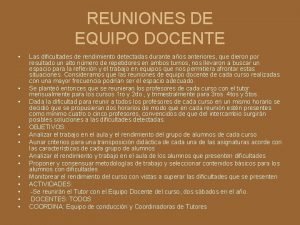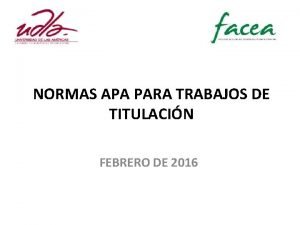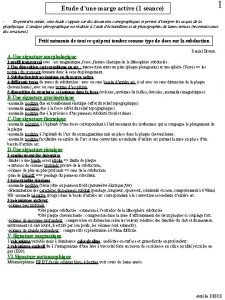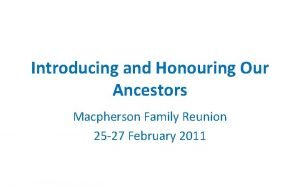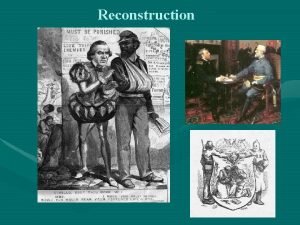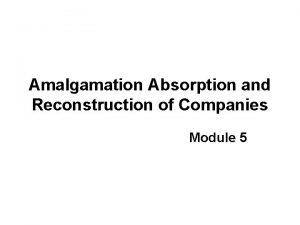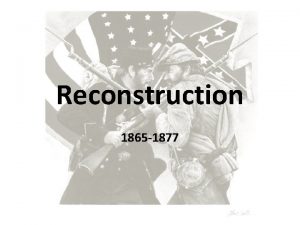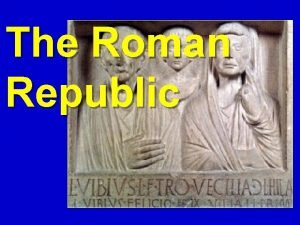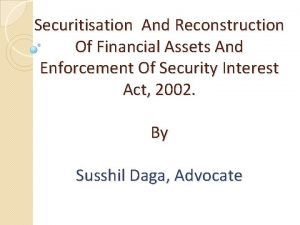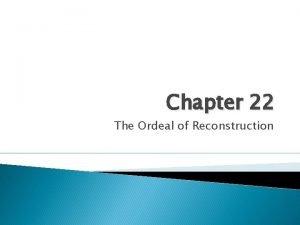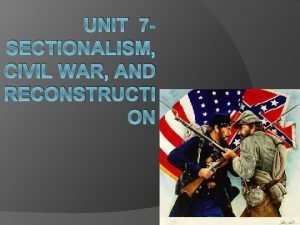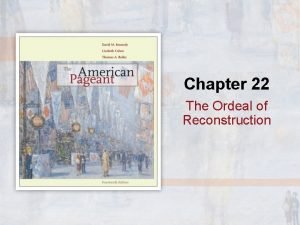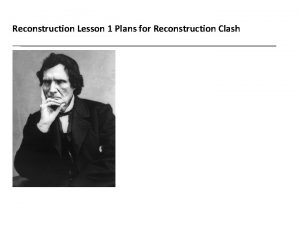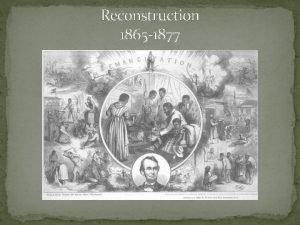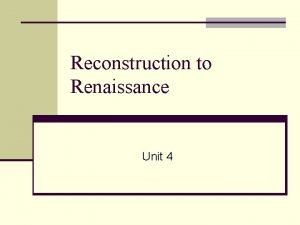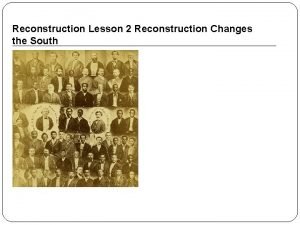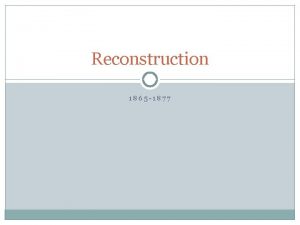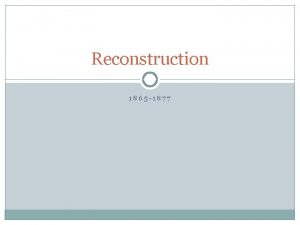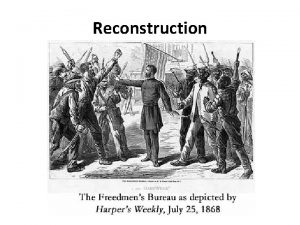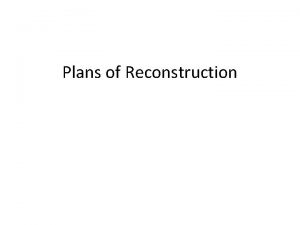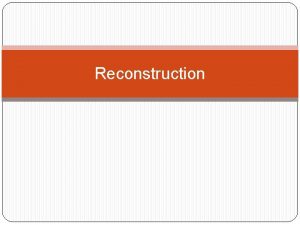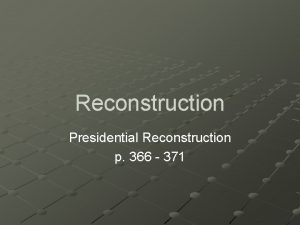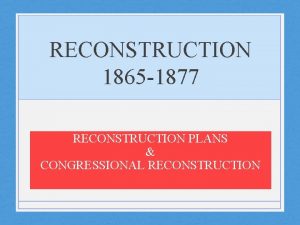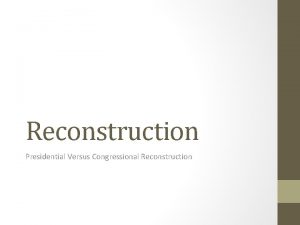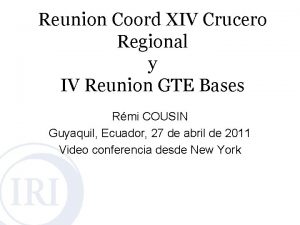Early Steps to Reunion RECONSTRUCTION The adaptation of










![Wade-Davis Bill (1864) « “Iron-Clad” Oath. « “State Suicide” Theory [MA Senator Charles Sumner] Wade-Davis Bill (1864) « “Iron-Clad” Oath. « “State Suicide” Theory [MA Senator Charles Sumner]](https://slidetodoc.com/presentation_image_h/118886b886bd9d3eb3918ffb38688e03/image-11.jpg)















































































![Northern Support Wanes « “Grantism” & corruption. « Panic of 1873 [6 -year depression]. Northern Support Wanes « “Grantism” & corruption. « Panic of 1873 [6 -year depression].](https://slidetodoc.com/presentation_image_h/118886b886bd9d3eb3918ffb38688e03/image-91.jpg)










- Slides: 101


Early Steps to Reunion

RECONSTRUCTION • ‘The adaptation of American society without _____ and the _______ of American society after the______. ’

• What would your plan for Reconstruction be? – How would the South be treated? – Any stipulations or sanctions placed on them to ensure they don’t rebel again? – What about for the freed slaves? How would they be treated? – Jot down your thoughts into your notebook

KEY QUESTIONS 1. 2. 3. 4. Would Reconstruction have been different if Lincoln finished his second term? Why was Andrew Johnson’s impeachment historically significant? Was Reconstruction a success? Why not? Create your own!

Two theories on Reconstruction 1) Work together with the South to bring about peace and reunification 2) Be stern and hard on the ex-Confederate states in order to prevent another uprising

President Lincoln’s Plan « 10% Plan * Proclamation of Amnesty and Reconstruction (December 8, 1863) * Replace majority rule with “loyal rule” in the South. * He didn’t consult Congress regarding Reconstruction. * Pardon to all but the highest ranking military and civilian Confederate officers. * When 10% of the voting population in the 1860 election had taken an oath of loyalty and established a government, it would be recognized.

President Lincoln’s Plan « 1864 “Lincoln Governments” formed in LA, TN, AR * * “loyal assemblies” They were weak and dependent on the Northern army for their survival.

Congress’ Plan • Radical Republicans, led by Charles Sumner of Massachusetts and Thaddeus Stevens of Pennsylvania, stressed any Reconstruction Plan must “revolutionize Southern institutions, habits, and manners. ”

Wade-Davis Bill (1864) « Required 50% of the number of 1860 voters to take an “iron clad” oath of allegiance (swearing they had never voluntarily aided the rebellion ). Senator Benjamin Wade (R-OH) « Required a state constitutional convention before the election of state officials. « Enacted specific safeguards of freedmen’s liberties. Congressman Henry W. Davis (R-MD)
![WadeDavis Bill 1864 IronClad Oath State Suicide Theory MA Senator Charles Sumner Wade-Davis Bill (1864) « “Iron-Clad” Oath. « “State Suicide” Theory [MA Senator Charles Sumner]](https://slidetodoc.com/presentation_image_h/118886b886bd9d3eb3918ffb38688e03/image-11.jpg)
Wade-Davis Bill (1864) « “Iron-Clad” Oath. « “State Suicide” Theory [MA Senator Charles Sumner] « “Conquered Provinces” Position [PA Congressman Thaddeus Stevens] « Lincoln vetoed the bill because he was not ready to “be inflexibly committed to any single plan of restoration. ” President Lincoln Pocket Veto Wade-Davis Bill

"Our country owed all her troubles to him, and God simply made me the instrument of his punishment” – JOHN WILKES BOOTH

Lincoln’s Assassination http: //www. history. com/videos/lincoln-the-diary-of-john-wilkes-booth#lincoln-after-the-assassination • National grief & panic • VP Andrew Johnson becomes president – Had been Tennessee congressman – His state seceded – He remains loyal to the Union

Lincoln Assassinated • The country would never know how Reconstruction would have gone with Lincoln as President. • On April 14, 1865, Lincoln was assassinated. • The assassin, John Wilkes Booth, shot Lincoln as he and his wife watched a play at the Ford Theatre in Washington. • Americans mourned his death, especially Southerners…why?




September 13, 2016 Do Now: Have out the primary document sheet from last week

13 th Amendment « Ratified in December, 1865. « Neither slavery nor involuntary servitude, except as punishment for crime whereof the party shall have been duly convicted, shall exist within the United States or any place subject to their jurisdiction. « Congress shall have power to enforce this article by appropriate legislation.

President Andrew Johnson « Jacksonian Democrat. « Anti-Aristocrat. « White Supremacist. « Agreed with Lincoln that states had never legally left the Union. Damn the negroes! I am fighting these traitorous aristocrats, their masters!

President Johnson’s Plan (10%+) « Offered amnesty upon simple oath to all except Confederate civil and military officers and those with property over $20, 000 (they could apply directly to Johnson) « In new constitutions, they must accept minimum conditions repudiating slavery, secession and state debts. « Named provisional governors in Confederate states and called them to oversee elections for constitutional conventions. 1. Disenfranchised certain leading Confederates. EFFECTS? 2. Pardoned planter aristocrats brought them back to political power to control state organizations. 3. Republicans were outraged that planter elite were back in power in the South!

– For readmission into the Union, rebelling states would need to nullify their acts of secession, abolish slavery, and refuse to pay Confederate debts • New state governments were elected and ex. Confederates dominated them – What kind of laws do you think were passed regarding newly freed slaves? • Johnson was too lenient towards these newly formed governments even overlooking Mississippi’s refusal to ratify the 13 th Amendment – 13 th Amendment abolished slavery in the U. S.

Growing Northern Alarm! « Many Southern state constitutions fell short of minimum requirements. « Johnson granted 13, 500 special pardons. « Revival of southern defiance. BLACK CODES

Black Codes • Black codes were laws passed in Southern states during Reconstruction that greatly limited the freedom of former slaves. • Examples of Black Codes: – – – Promoted racial segregation in some places Prohibited interracial marriage Jury service by blacks Court testimony by blacks against whites All codes had provisions in them which basically barred former slaves from leaving the plantation

Quotes regarding Black Codes • Of the Black Codes, one African American veteran demanded, “If you call this Freedom, what do you call Slavery” • The Chicago Tribune proclaimed, “The men of the North will convert the State of Mississippi into a frog pond before they will allow such laws to disgrace one foot of soil in which the bones of our soldiers sleep and over which the flag of freedom waves. ”

Violence in the South • Race Riots were becoming widespread across the South. • Johnson’s call for leniency towards the ex. Confederate states were becoming absurd in the wake of such violence.

Congress Breaks with the President « Congress bars Southern Congressional delegates. « Joint Committee on Reconstruction created. « February, 1866 President vetoed the Freedmen’s Bureau bill. « March, 1866 Johnson vetoed the 1866 Civil Rights Act. « Congress passed both bills over Johnson’s vetoes 1 st in U. S. history!!

Congress vs. Johnson • Freedmen’s Bureau – What was it? • An organization that helped millions of southern freedmen left homeless and hungry after the war. • It distributed food and clothing, as well as, set up hospitals and schools. – What did Johnson do? • He vetoed an attempt to extend the organization’s life.

Congress vs. Johnson • The Civil Rights Act of 1866 – What was it? • First civil rights law in U. S. history; it declared everyone born in the U. S. was a citizen with full civil rights. – What did Johnson do and what happened as a result? • Johnson vetoed the bill; however, Congress voted and passed it over his veto.


What do you think of when you see this flag? How does it make you feel? What does it represent? Should individuals be allowed to fly this flag in the United States?



Who were the Radical Republicans? • Radical Republicans, led by Charles Sumner of Massachusetts and Thaddeus Stevens of Pennsylvania, stressed any Reconstruction Plan must “revolutionize Southern institutions, habits, and manners. ”

“ Hi…. . I’m Charles Sumner.

“ Hi…. . I’m Thaddeus Stevens.

The 1866 Bi-Election « A referendum on Radical Reconstruction. « Johnson made an ill-conceived propaganda tour around the country to push his plan. « Republicans won a 3 -1 majority in both houses and gained control of every northern state. Johnson’s “Swing around the Circle”

Elections of 1866 • Citizens grew tired of Johnson’s calls for leniency with such violence in the South. • As a result, the Radical Republicans won an overwhelming victory in the elections of 1866 “Yo Radical Republicans!! We did it!!”

Radical Plan for Readmission « Civil authorities in the territories were subject to military supervision. « Required new state constitutions, including black suffrage and ratification of the 13 th and 14 th Amendments. « In March, 1867, Congress passed an act that authorized the military to enroll eligible black voters and begin the process of constitution making.

Reconstruction Acts of 1867 « Military Reconstruction Act * * Restart Reconstruction in the 10 Southern states that refused to ratify the 14 th Amendment. Divide the 10 “unreconstructed states” into 5 military districts.

Reconstruction Acts of 1867 « Command of the Army Act * The President must issue all Reconstruction orders through the commander of the military. « Tenure of Office Act * The President could not remove any officials [esp. Cabinet members] without the Senate’s consent, if the position originally required Senate approval. § Designed to protect radical members of Lincoln’s government. § A question of the constitutionality of this law. Edwin Stanton

President Johnson’s Impeachment « Johnson removed Stanton in February, 1868. « Johnson replaced generals in the field who were more sympathetic to Radical Reconstruction. « The House impeached him on February 24 before even drawing up the charges by a vote of 126 – 47!

The Senate Trial « 11 week trial. « Johnson acquitted 35 to 19 (one short of required 2/3 s vote).



IMPEACHED BUT NOT CONVICTED




“If… the President must step down…the office of President would be degraded…. It would have revolutionized our splendid political fabric into a partisan Congressional autocracy…. If Andrew Johnson were acquitted by a non partisan vote…America would pass the danger point of partisan rule and that intolerance which so characterizes the sway of great majorities and makes them dangerous. ” - SENATOR EDMUND ROSS WHY DID ROSS VOTE NOT GUILTY?

POLITICAL CARTOONS Critical Thinking • Identifying the Artist – Thomas Nast, Harper’s Weekly • Listing the Caption • Identifying the utilization of symbolism or caricature • Explaining the use of historical references • Identifying the Issue • Recognizing Satire or the use of humor • Recognizing Generalizations or Stereotyping • Interpreting the Message/Viewpoint of Artist • Judging the Cartoonist’s Bias based on your point of view

th 14 Amendment « Ratified in July, 1868. * Provide a constitutional guarantee of the rights and security of freed people. * Insure against neo-Confederate political power. * Enshrine the national debt while repudiating that of the Confederacy. « Southern states would be punished for denying the right to vote to black citizens!



Waving the Bloody Shirt! Republican “Southern Strategy”

The Election of 1868 • Republican nominee – General Ulysses S. Grant. • Democrat nominee – Horatio Seymour • Grant won a slim victory due to the African. American vote

1868 Presidential Election

Grant Administration Scandals « Grant presided over an era of unprecedented growth and corruption. * Credit Mobilier Scandal. * Whiskey Ring. * The “Indian Ring. ”

The Tweed Ring in NYC William Marcy Tweed (notorious head of Tammany Hall’s political machine) [Thomas Nast crusading cartoonist/reporter]

And They Say He Wants a Third Term

The Election of 1872 « Rumors of corruption during Grant’s first term discredit Republicans. « Horace Greeley runs as a Democrat/Liberal Republican candidate. « Greeley attacked as a fool and a crank. « Greeley died on November 29, 1872!

1872 Presidential Election

The Panic of 1873 « It raises “the money question. ” * * debtors seek inflationary monetary policy by continuing circulation of greenbacks. creditors, intellectuals support hard money. « 1875 Specie Redemption Act. « 1876 Greenback Party formed & makes gains in congressional races The “Crime of ’ 73’!

Legal Challenges « The Slaughterhouse Cases (1873) « Bradwell v. IL (1873) « U. S. v. Cruickshank (1876) « U. S. v. Reese (1876)


White Southern Republicans • Many whites in the South felt that any southerner who helped the Republicans was a traitor. • Many were known as scalawags – Scalawags- derogatory word/slang term to insult a white southern republican

Northern Republicans • Were strongly disliked by Southerners. • Became known as carpetbaggers – Carpetbaggersnortherners who came to the South to take advantage of their troubles

African Americans • Earned the right to vote as well as run for office. • Still faced many hardships including racism, poverty, and a continuing struggle for equality.

Freedmen’s Bureau Seen Through Southern Eyes Plenty to eat and nothing to do.

Black Codes « Purpose: * * Guarantee stable labor supply now that blacks were emancipated. Restore pre-emancipation system of race relations. « Forced many blacks to become sharecroppers [tenant farmers].

Black Codes Freedmen CAN - Marry legally Freedmen CANNOT - Vote - Own guns - Serve on juries IN MOST STATES… - Freedmen could only work as servants or farm laborers - Freedmen had to sign a contract for a year’s work …those who had no contract could be arrested & sentenced to work on a plantation Would an employer be inclined to offer a contract? Why or why not? ? ?

Sharecropping

Tenancy & the Crop Lien System Furnishing Merchant § Loan tools and seed up to 60% interest to tenant farmer to plant spring crop. § Farmer also secures food, clothing, and other necessities on credit from merchant until the harvest. § Merchant holds “lien” {mortgage} on part of tenant’s future crops as repayment of debt. Tenant Farmer § Plants crop, harvests in autumn. § Turns over up to ½ of crop to land owner as payment of rent. § Tenant gives remainder of crop to merchant in payment of debt. Landowner § Rents land to tenant in exchange for ¼ to ½ of tenant farmer’s future crop.

Black & White Political Participation

The Balance of Power in Congress State White Citizens Freedmen SC 291, 000 411, 000 MS 353, 000 436, 000 LA 357, 000 350, 000 GA 591, 000 465, 000 AL 596, 000 437, 000 VA 719, 000 533, 000 NC 631, 000 331, 000

Establishment of Historically Black Colleges in the South

Colored Rule in the South?

Black Senate & House Delegates

15 th Amendment « Ratified in 1870. « The right of citizens of the United States to vote shall not be denied or abridged by the United States or by any state on account of race, color, or previous condition of servitude. « The Congress shall have power to enforce this article by appropriate legislation. « Women’s rights groups were furious that they were not granted the vote!

So Let’s Review the Civil War Amendments… • 13 th Amendment – Abolished slavery • 14 th Amendment – Extended equal citizenship to anyone born or naturalized in the United States and it also denied states the right to deprive anyone of life, liberty, or property without due process of law. • 15 th Amendment – The right to vote can not be taken away on account of race

The “Invisible Empire of the South”

Ku Klux Klan Origins Goals • Founded by Nathan Bedford Forrest • It grew quickly among all sorts of whites in the South • Destroy the Republican Party • Keep African Americans from voting • Frighten African American leaders into submission

Steps Against the Klan African Americans Federal Government • They banned together in • Passed the Enforcement Acts, order to protect which were 3 laws empowering themselves. the combat terrorism with military force. WE GOT THIS!!!!


Warm Up • Draw a triangle. – Of the following 5 words, choose 3. • Scalawag, Carpetbagger, Conservatives, KKK, Sharecroppers – You must be able to connect those three words to one another on the triangle and explain your connections.

The Civil Rights Act of 1875 « Crime for any individual to deny full & equal use of public conveyances and public places. « Prohibited discrimination in jury selection. « Shortcoming lacked a strong enforcement mechanism. « No new civil rights act was attempted for 90 years!

The Rise of Jim Crow • Southerners kept African Americans from voting by initiating poll taxes and literacy tests. • Laws designed to enforce segregation, or separation, of the races soon emerged. – These were called Jim Crow Laws.

Plessy v. Ferguson • These discriminatory laws were tested and brought all the way to the Supreme Court. • The Supreme Court ruled in favor of the segregation laws as long as the accommodations were “separate but equal” • Separate but equal became the law of the South

Responses to the Jim Crow Era • Booker T. Washington – He believed achieving economic independence was key in gaining equality – African Americans should not protest discrimination • Ida B. Wells – She called for cooperation with Southern whites in order to gain equality

![Northern Support Wanes Grantism corruption Panic of 1873 6 year depression Northern Support Wanes « “Grantism” & corruption. « Panic of 1873 [6 -year depression].](https://slidetodoc.com/presentation_image_h/118886b886bd9d3eb3918ffb38688e03/image-91.jpg)
Northern Support Wanes « “Grantism” & corruption. « Panic of 1873 [6 -year depression]. « Concern over westward expansion and Indian wars. « Key monetary issues: * * should the government retire $432 m worth of “greenbacks” issued during the Civil War. should war bonds be paid back in specie or greenbacks.

1876 Presidential Tickets

1876 Presidential Election

Election of 1876 • Democrat Samuel Tilden defeated Republican Rutherford B. Hayes in the popular vote. • However, Hayes beat Tilden by one electoral vote • The Southern Democrats were furious over the results!!

The Political Crisis of 1877 « “Corrupt Bargain” Part II?

The Deal that Changed History • The Compromise of 1877 – In return for the Democrats acceptance of Hayes as President, the Republicans agreed to withdraw the remaining federal troops from the South. • This essentially ended Reconstruction and led to the New South

With a partner, write down your thoughts and feelings regarding the Compromise of 1877. Who do you think benefited from the deal? Who lost? Do you think it was fair or unfair? Explain your answer.

Hayes Prevails

A Political Crisis: The “Compromise” of 1877

A Little Bug’s Life Anyoneeeee? ? Jot down/ bullet as many connections to the Reconstruction as you can think of during this 3 minute clip. THINK! Abstract, examples, races, classes, politicians, etc… http: //www. youtube. com/watch? v=Hu. Tzd-uz 7 HM

The “New South” • Cotton production was back to the way it was in 1860. • More textile factories were built. • The tobacco industry was soaring. • Mineral resources like iron ore, coal, steel, and oil were now being mined and used. • Industry was now booming in the South!
 Early cpr and early defibrillation can: *
Early cpr and early defibrillation can: * Early steps treasure coast
Early steps treasure coast Which is an example of axial movement?
Which is an example of axial movement? Tambor es esdrújula llana o aguda
Tambor es esdrújula llana o aguda Agenda para una reunion de padres de familia
Agenda para una reunion de padres de familia Oracion para una reunion
Oracion para una reunion Objetivo de una reunión informativa
Objetivo de una reunión informativa Académie de la réunion
Académie de la réunion Réunion d'équipe
Réunion d'équipe Outil animation réunion
Outil animation réunion Centre ssr cugand
Centre ssr cugand Pugh family reunion
Pugh family reunion Er reunion
Er reunion Fiche préparation réunion
Fiche préparation réunion Reunion de padres nota
Reunion de padres nota James brown grandchildren
James brown grandchildren Hughes airwest reunion
Hughes airwest reunion Nombres del tabernaculo
Nombres del tabernaculo Proyeccion generalizada algebra relacional
Proyeccion generalizada algebra relacional Reunión de equipo docente
Reunión de equipo docente Modelo de citación a reunión
Modelo de citación a reunión Modelo de citación a reunión
Modelo de citación a reunión Carte reunion
Carte reunion Reunion f95
Reunion f95 Palabras con triptongo
Palabras con triptongo Ars reunion
Ars reunion Vilma and bobot
Vilma and bobot A una reunion asisten 10 personas y se intercambian saludos
A una reunion asisten 10 personas y se intercambian saludos Muchas gracias por venir a la reunión
Muchas gracias por venir a la reunión El altar familiar una necesidad de nuestro tiempo
El altar familiar una necesidad de nuestro tiempo A mcpherson pro reunion
A mcpherson pro reunion Thẻ vin
Thẻ vin Tư thế ngồi viết
Tư thế ngồi viết Cái miệng nó xinh thế chỉ nói điều hay thôi
Cái miệng nó xinh thế chỉ nói điều hay thôi Các châu lục và đại dương trên thế giới
Các châu lục và đại dương trên thế giới Bổ thể
Bổ thể Từ ngữ thể hiện lòng nhân hậu
Từ ngữ thể hiện lòng nhân hậu Tư thế ngồi viết
Tư thế ngồi viết Thế nào là giọng cùng tên?
Thế nào là giọng cùng tên? 101012 bằng
101012 bằng Thơ thất ngôn tứ tuyệt đường luật
Thơ thất ngôn tứ tuyệt đường luật Hát lên người ơi
Hát lên người ơi Khi nào hổ mẹ dạy hổ con săn mồi
Khi nào hổ mẹ dạy hổ con săn mồi đại từ thay thế
đại từ thay thế Diễn thế sinh thái là
Diễn thế sinh thái là Vẽ hình chiếu vuông góc của vật thể sau
Vẽ hình chiếu vuông góc của vật thể sau Công của trọng lực
Công của trọng lực Thế nào là mạng điện lắp đặt kiểu nổi
Thế nào là mạng điện lắp đặt kiểu nổi Tỉ lệ cơ thể trẻ em
Tỉ lệ cơ thể trẻ em Lời thề hippocrates
Lời thề hippocrates Vẽ hình chiếu đứng bằng cạnh của vật thể
Vẽ hình chiếu đứng bằng cạnh của vật thể Quá trình desamine hóa có thể tạo ra
Quá trình desamine hóa có thể tạo ra Các môn thể thao bắt đầu bằng tiếng nhảy
Các môn thể thao bắt đầu bằng tiếng nhảy Hát kết hợp bộ gõ cơ thể
Hát kết hợp bộ gõ cơ thể Khi nào hổ con có thể sống độc lập
Khi nào hổ con có thể sống độc lập điện thế nghỉ
điện thế nghỉ Dot
Dot Thế nào là sự mỏi cơ
Thế nào là sự mỏi cơ độ dài liên kết
độ dài liên kết Trời xanh đây là của chúng ta thể thơ
Trời xanh đây là của chúng ta thể thơ Chó sói
Chó sói Thiếu nhi thế giới liên hoan
Thiếu nhi thế giới liên hoan Fecboak
Fecboak Một số thể thơ truyền thống
Một số thể thơ truyền thống Thế nào là hệ số cao nhất
Thế nào là hệ số cao nhất Sơ đồ cơ thể người
Sơ đồ cơ thể người Các số nguyên tố là gì
Các số nguyên tố là gì đặc điểm cơ thể của người tối cổ
đặc điểm cơ thể của người tối cổ Cách giải mật thư tọa độ
Cách giải mật thư tọa độ Các châu lục và đại dương trên thế giới
Các châu lục và đại dương trên thế giới Thang điểm glasgow
Thang điểm glasgow ưu thế lai là gì
ưu thế lai là gì Roche abbey reconstruction
Roche abbey reconstruction Civil war and reconstruction study guide
Civil war and reconstruction study guide What ended reconstruction
What ended reconstruction Cgal poisson reconstruction
Cgal poisson reconstruction Transitive closure in discrete mathematics
Transitive closure in discrete mathematics Reconstruction drawing of mammoth-bone houses
Reconstruction drawing of mammoth-bone houses Environmental reconstruction
Environmental reconstruction The term reconstruction refers to
The term reconstruction refers to Reconstruction interactive notebook
Reconstruction interactive notebook Parallel reconstruction
Parallel reconstruction Reconstruction apush
Reconstruction apush What were the immediate effects of reconstruction
What were the immediate effects of reconstruction Reconstruction oklahoma
Reconstruction oklahoma Reconstruction era
Reconstruction era Define amalgamation absorption and reconstruction
Define amalgamation absorption and reconstruction Unit 4: civil war and reconstruction
Unit 4: civil war and reconstruction I-69 southwest/i-610 west loop interchange reconstruction
I-69 southwest/i-610 west loop interchange reconstruction Presidential reconstruction
Presidential reconstruction How was rome founded
How was rome founded Surface reconstruction from unorganized points
Surface reconstruction from unorganized points Grandfather clause reconstruction
Grandfather clause reconstruction What was reconstruction? *
What was reconstruction? * Hannibal barca reconstruction
Hannibal barca reconstruction Securitisation and reconstruction of financial assets
Securitisation and reconstruction of financial assets Ordeal chapter 22
Ordeal chapter 22 Reconstruction notes
Reconstruction notes Reconstruction
Reconstruction Remembering world war 1 achieve 3000
Remembering world war 1 achieve 3000 Military district reconstruction
Military district reconstruction




